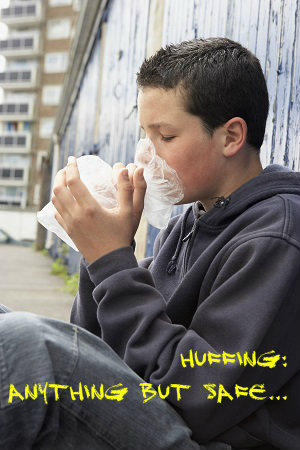Huffing: A Dangerous Trend For Teens
Alcohol, street drugs, prescription drugs and over-the-counter medications are not the only way kids are getting high and it is imperative that parents become aware. Teens are “huffing” all sorts of common household items in order to get a fast buzz.
 Teens and preteens looking for a cheap high are willing to experiment with breathing in powerful household products like nail polish remover, hair spray, aerosol deodorants, computer cleaner, correction fluid and even aerosol from whip cream canisters. These and other toxic substances are found in nearly every room in American homes. The problem is that many parents, like their young teens, fail to recognize the dangers. A single attempt at huffing has been enough to kill some youth.
Teens and preteens looking for a cheap high are willing to experiment with breathing in powerful household products like nail polish remover, hair spray, aerosol deodorants, computer cleaner, correction fluid and even aerosol from whip cream canisters. These and other toxic substances are found in nearly every room in American homes. The problem is that many parents, like their young teens, fail to recognize the dangers. A single attempt at huffing has been enough to kill some youth.
Huffing is also called dusting or sniffing. Kids trap the toxic chemicals in a small plastic bag which they then hold up to their face before inhaling deeply. This gives them a five to 10 second rush or high. Teens inhale magic markers, household paint, Freon from air-conditioners and refill cartridges for butane lighters.
Dangerously False “Safer” Perception
In recent years there has been a trend among teens away from illegal street drugs towards substances that teens consider more ‘safe.’ Prescription and over-the-counter medications became more widely used for a time until cost and safety measures made them hard to come by. Now inhalants are popular. Not only do these products seem harmless to teens, they are also inexpensive and easy to obtain. Most of the time teens can simply help themselves to something already on the shelf at home. If not, no one will question them when they buy these things at the store.
The truth is that these products are safe when used for their intended purposes and according to their package directions. They are anything but safe when inhaled in order to get high. At best, repeated exposure will injure vital organs (kidneys, liver, lungs, heart and brain). At worst, kids can experience heart attack – referred to as Sudden Sniffing Death Syndrome – or suffocation. Parents who had no idea their child was huffing have gone into their child’s room to find them dead on the floor with a bottle of computer cleaner still clenched in their fingers.
Parents should talk with their teens and even preteens about the dangers of breathing in toxic fumes and chemicals. Kids are huffing even in elementary school, so it isn’t a discussion that needs to wait for high school – it can happen while using these household items or it can be part of a sit-down conversation about drug use in general. Tell your kids that while a product can be safe to use it can still be poisonous. Poison is an important adjective since it communicates just how serious these substances really are.
Parents Can Also Keep Their Eyes Open To Signs Of Huffing, Including:
- Finding plastic bags with a chemical odor to them
- Aerosol products or strong chemical items disappearing entirely or running out quickly
- Teens having the smell of chemicals on their breath
- Symptoms of intoxication, such as red and watery eyes, slurred speech or dazed appearances
- Paint, correction fluid or magic marker stains on their face
- Household products being out of place or perhaps even in the teen’s room.
The best defense is a strong offense, so talk with kids about what their friends might be doing. Talk about why kids might be looking to get high. If your child is huffing regularly, get professional help. Huffing can be addictive in the same way as drugs or alcohol, and kids won’t know which sniff could be their last.



